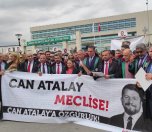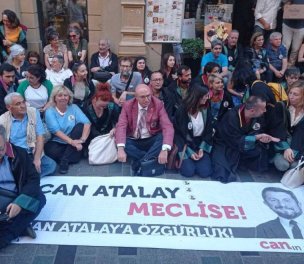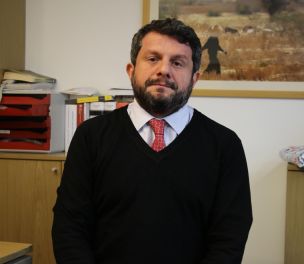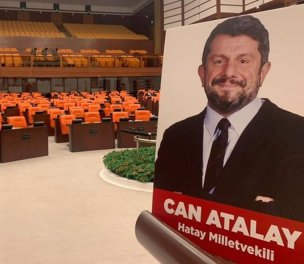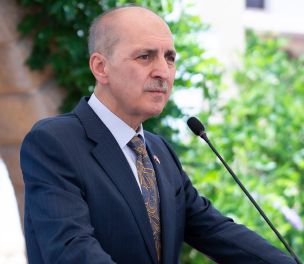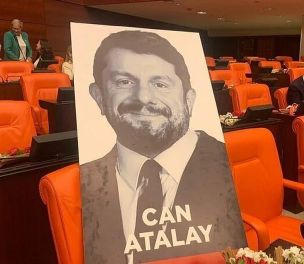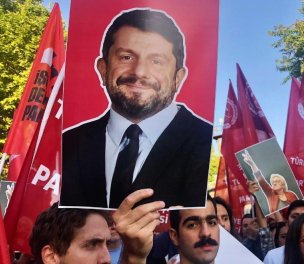Click to read the article in Turkish
It is expected that the laws are interpreted pursuant to the Constitution. Moreover, in states governed by constitutional pluralist democracy, the Constitution provisions themselves are interpreted according to the telo (main goal) of constitutionalism. Although we are moving away from a constitutional pluralist democracy by leaps, I wish to approach the fact that lawyer Can Atalay, elected an MP on May 14, 2023, is still not being released from prison, from this perspective.
If we want to understand constitutional institutions such as parliamentary immunity, first we should understand why there was a need for them in the first place, and which legal interests are those that they exist to protect. Both parliamentary unaccountability, protecting an MP's freedom of speech, thought, and voting in the parliament, and parliamentary immunity, protecting MPs from their parliamentary work being halted using the tools of criminal laws, such as detention or arrest serve to establish a pluralist democracy, protect mainly the opposition in the face of unfounded allegations, and provides pluralism. In other words, it is parliamentary immunity that ensures the representation of the will of the electorate in the parliament and provides protection to the legislative power protection from interventions from outside.
In that sense, these constitutional institutions serve the general interest. Besides, parliamentary immunities also protect some legal interests with respect to individual rights and freedoms; ensuring that an elected MP can work freely, it serves both the MP's right to be elected and right to personal freedom and safety. (*)
In recent years, the necessity for these immunities, especially those preventing an MP to stand trial, being questioned, detained, or arrested, is being widely discussed in Western democracies. The societies that have adequately secured judicial independence and impartiality, that trust in their judiciary approach the matter in terms of the principle of equality and the right to a fair trial, and may not find it meaningful that an MP is given such a "privilege" compared to the ordinary citizens, and may make regulations placing limitations on these immunities. These immunities, which emerged historically in the United Kingdom for the first time and spread to continental Europe, have become insignificant mostly in this country, in the United Kİngdom, due to the faith in the judiciary.
In our country, however, today the significance of these immunities has been well understood today, while in the 1990s there were discussions on bringing limitations on the same. Parliamentary immunity was included in all our Constitutions starting with the Ottoman Basic Law of 1876, except for the 1921 Constitution; and it has never been harmed so far. Never have there been so many MPs whose parliamentary immunity has been lifted in any period. Turkey is experiencing the problem of opposition MPs with restricted freedoms in the 2000s, especially since the 2011 elections.
In 2016, a Constitutional amendment providing for the lifting of immunities en masse, which is completely contrary to the Constitution, made the problem worse. In the process that started with Mehmet Haberal (B.N. 2012/849) and Mustafa Ali Balbay (B.N. 2012/1272) cases, the Constitutional Court had to give an unexpected number of rulings regarding immunities of opposition MPs and created a kind of case law on parliamentary immunities. With the last Ömer Faruk Gergerlioğlu decision (B.N. 2019/10634), the Court has clarified the situation that MP lawyer Can Atalay is facing today. Accordingly, the proceedings should now be stopped in the trial Atalay is standing.
The Constitutional Court has clarified one of the two exceptions in Article 83 of the 1982 Constitution regulating parliamentary immunity. When regulating parliamentary immunity, the related article exempted being caught red-handed just like in many democratic countries. Of course, it is difficult for an MP caught red-handed to claim that his/her participation in legislative work is being prevented based on unfounded allegations; therefore the MP cannot make use of immunity. The second exception is one that was not included in any of our previous Constitutions but was included in the 1982 Constitution. Not present in the draft of the civilians in the Constituent Assembly that prepared the 1982 Constitution, but included in the Constitution by the military wing who had made the 1980 military coup, this exception reads, "the situations set forth in Article 14 of the Constitution**, provided that the investigation has started before being elected." This exception has been studied in detail in the Gergerlioğlu ruling, and since there is no law regulating how Article 14 will be implemented, it was ruled that it involves uncertainty, to such an extent to allow unlawful intervention on the legal rights to be elected and to carry out political activities. Article 14 of the Constitution really consists of many definitions that are abstract, possible for different interpretations; and although it is stated that the implementation should be regulated with a law, no such law has been enacted.
This article which bans the abuse of fundamental rights does not indicate which crimes constitute exceptions for parliamentary immunity. Since the same is not regulated by a law, Article 83 which makes reference to Article 14 allows a large margin for discretion to the judicial authorities, or put in different words, it involves uncertainty and opens the door to unpredictability and arbitrariness. This second exception is not present in the constitutions of democratic countries, and it was included in the 1982 Constitution by the National Security Council that staged the 1980 coup in Turkey. The other courts insist on advocating and putting forward this exception, but this is completely in contradiction with the telo, the main goal of constitutionalism. The main goal of constitutionalism is to limit power, prevent arbitrariness, and protect rights and freedoms in this way. It is a great contradiction that the politicians and members of the judiciary who talk about the 1982 Constitution not being a civil one are so sensitive about one of the most "military" provisions of it.
The Court of Cassation is openly challenging the Gergerlioğlu ruling of the Constitutional Court in its decision on Can Atalay given yesterday. While the Constitutional Court is emphasizing that the judiciary cannot be given so much freedom in limiting the rights and freedoms and interpreting the Constitution Article for the benefit of the rights and freedoms, the Court of Cassation is interpreting the article in the opposite direction.
The justification of the Court of Cassation is also shocking. It includes the following expressions: "The authority of the Constitutional Court for examining and checking into a constitutional provision is limited with a formal check. It is clear that a constitutional provision cannot be repealed, or made impossible to implement, through an individual application that is of secondary character. Taking this into consideration, the Constitutional Court does not have the power to cancel a constitutional norm in force. The Court can only examine and check a constitutional amendment formally, and it is not possible for the Court to give a ruling to eliminate, or make dysfunctional the implementation of a constitutional norm in force by way of an individual application, and therefore..."
The Court of Cassation is teaching the Constitutional Court what it can and what it cannot do, and how it should interpret a provision of the Constitution. From the point of view of the Court of Cassation which has forgotten that it is the Constitutional Court who is the final body to interpret the provisions of the Constitution, the Constitutional Court is no longer necessary.
Now it is the Constitutional Court's turn to speak. The decision to be given by the Constitutional Court and its execution will either make our distance to a constitutional, pluralist democracy shorter, or it will make it even longer.
(*) On this also see. Eyüp Kaan Demirkıran, Karşılaştırmalı Hukukta ve Türk Hukukunda Yasama Bağışıklıkları (Parliamentary Immunities in Comparative Law and the Turkish Law), Marmara University, Social Sciences Institute, PhD thesis on public law, İstanbul 2023.
(**) Under the subtitle "Prohibition of abuse of fundamental rights and freedoms", Article 14 of the Constitution of the Republic of Turkey says:
ARTICLE 14- (As amended on October 3, 2001; Act No. 4709) None of the rights and freedoms embodied in the Constitution shall be exercised in the form of activities aiming to violate the indivisible integrity of the State with its territory and nation, and to endanger the existence of the democratic and secular order of the Republic based on human rights. No provision of this Constitution shall be interpreted in a manner that enables the State or individuals to destroy the fundamental rights and freedoms recognized by the Constitution or to stage an activity with the aim of restricting them more extensively than stated in the Constitution. The sanctions to be applied against those who perpetrate activities contrary to these provisions shall be determined by law. (Sİ/ Mİ/PE)





.jpg)
